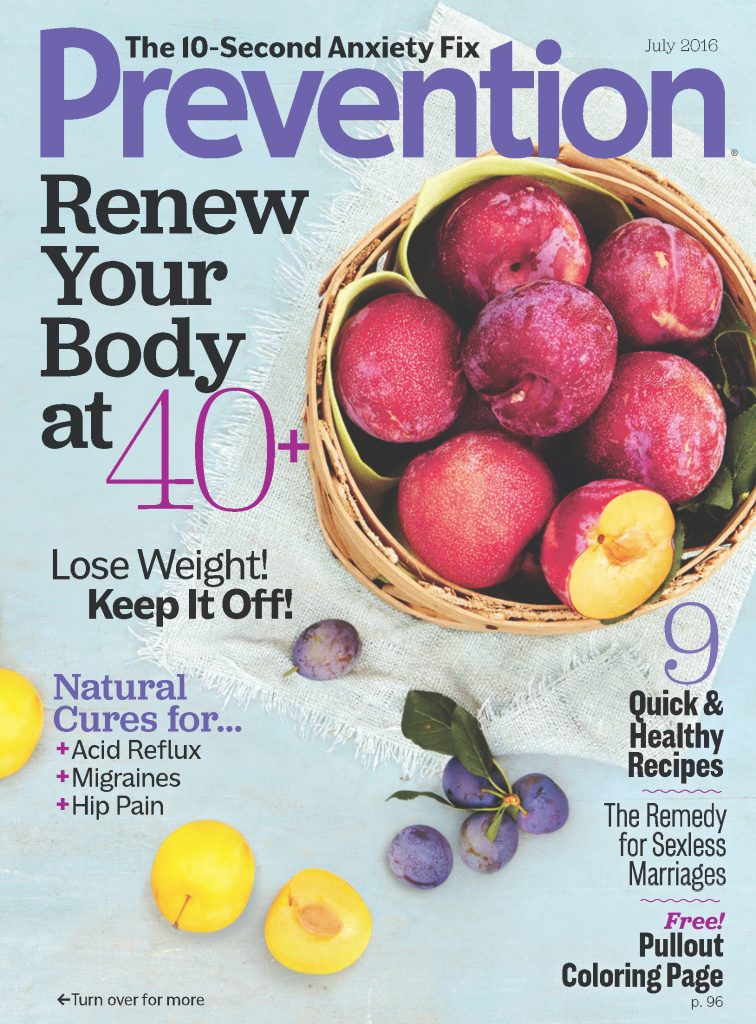The print magazine industry is having a health crisis. Amidst a culture of rampant free content, publishers have cut deals for advertisers and agencies to match the downward spiral of digital prices. Costs are going up everywhere as everyone wants to grow and earn more money, yet this culture of discounting rewards everyone for paying less, which erodes everyone’s wealth. It’s a downward spiral for everyone (except for the few who have mastered the current paradigm).
But health—good health—is priceless.
Back in February I made the announcement that Prevention magazine would be going ad-free starting with our July issue. Next Tuesday, June 14, the new Prevention will hit newsstands (what’s left of them!). Prevention going ad-free is a positive step to creating a profitable new model for the print industry—especially when it comes to information about your health.

The truth is, good health information is hard to find. Interpreting and analyzing scientific journals and data is both an art and a journalistic science in and of itself. And the courage to go beyond science (where science has not yet gone) is an even rarer art in journalism. At Rodale, we have one of the largest and deepest private journalistic health libraries in the world, along with highly experienced research librarians who read every journal and every study and review every trend and supply that to our editors, who then translate that to the readers of all our magazines: Prevention, Men’s Health, Women’s Health, Runners’ World, Bicycling, and Rodale’s Organic Life. And that is something of value—something worth paying for at a price much cheaper than a visit to the doctor. Any doctor!
With the launch of the new ad-free Prevention magazine, we have an opportunity to try new things. There is a sense of editorial freedom and the opportunity to be more hard-hitting in our reporting when we don’t have to worry about advertiser sensitivities. So you get our best insights, our deepest analysis, and the unvarnished truth—integrating our holistic and environmental expertise—so you can make the best decisions about your own health. As one example, in our first ad-free issue, we report on sunscreens, first explaining that sunscreens don’t actually protect you from skin cancer the way you might have believed and letting you know they are also responsible for devastating damage of coral reefs around the world.
But the DNA of Rodale is always about bringing you positive solutions—and we do that: how to really avoid skin cancer while enjoying the sunshine (which, by the way, is necessary for good health! Vitamin D!). And which sunscreens are the most effective from both a health and environmental perspective so both you and the fish and the sea life can keep enjoying coral reefs long into the future.
Health information can be highly complicated and confusing. We try to make it simple so you can make the choices you want to make about your life and health and enjoy every day. With the new Prevention magazine, we make it easy. But you won’t find it free online (free online doesn’t pay for those research librarians!). You can find it at the newsstand or subscribe to it online. And when it you get it, you can sit down and relax with a cup of tea or coffee and be surprised just how easy and wonderful good health and happiness can be.
And that is worth it!




How smart Maria!!!
But then I would now expect any less!
Looking forward to reading.
Sending hugs,
Rosalba
Interesting theory. Can you keep your vested interests like “Wheat Belly” from mucking up the truth?
Turn on tv for 1/2 hour. You will come to believe that the only nutrient we need is protein and that protein suitable for dogs only comes from meat.
Fact of the matter is protein is made up of a combination of amino acids whether it is meat or plant based an amino acid is an amino acid. Recent research shows that too much protein could multiply the possibility of cancer risk. Reliance on meat protein increases the risk plus is non sustainable when it takes an average of 6 lbs. of plant protein to put 1 lb. of meat on animal. Dairy cows drink 95 liters of water a day. Algae bloom is the result of fertilizers.
Somebody better come to grips on the truth; whether we want to hear it or not; we need to hear it.